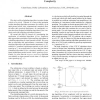Free Online Productivity Tools
i2Speak
i2Symbol
i2OCR
iTex2Img
iWeb2Print
iWeb2Shot
i2Type
iPdf2Split
iPdf2Merge
i2Bopomofo
i2Arabic
i2Style
i2Image
i2PDF
iLatex2Rtf
Sci2ools
138
click to vote
AICT
2005
IEEE
2005
IEEE
Approximations to Maximum Weight Matching Scheduling Algorithms of Low Complexity
The choice of the scheduling algorithm is a major design criteria of a switch. Whereas it is known that maximum weight matching algorithms guarantee the stability of an input queued switch, their computational complexity does not allow their practical deployment. In consequence, researchers have designed scheduling algorithms of low complexity and with satisfying performance features. We extend this field of research by investigating the application of matching algorithms of low complexity that approximate maximum weight matching algorithms as scheduling algorithms for input queued switches. We prove that an algorithm that approximates a maximum weight matching algorithm with approximation parameters (c, d), stabilizes a combined input/output-queued switch with a speed-up of 1 c . As an application, we show that four known scheduling algorithms of low complexity stabilize a combined input/output-queued switch with a speed-up of two. Finally, we prove that the improve matching algorit...
Related Content
| Added | 24 Jun 2010 |
| Updated | 24 Jun 2010 |
| Type | Conference |
| Year | 2005 |
| Where | AICT |
| Authors | Claus Bauer |
Comments (0)

